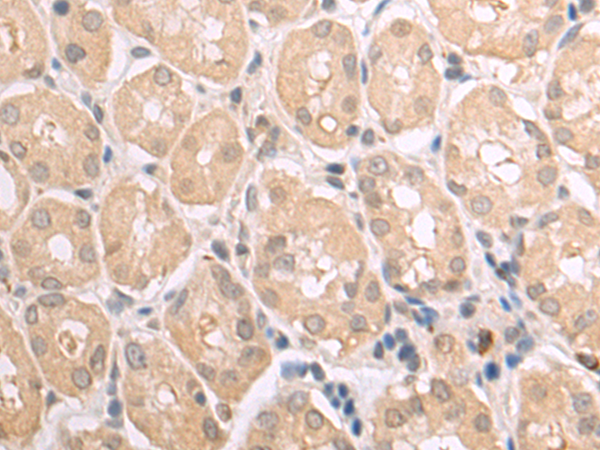
| WB | 咨询技术 | Human,Mouse,Rat |
| IF | 咨询技术 | Human,Mouse,Rat |
| IHC | 1/25-1/100 | Human,Mouse,Rat |
| ICC | 技术咨询 | Human,Mouse,Rat |
| FCM | 咨询技术 | Human,Mouse,Rat |
| Elisa | 1/5000-1/10000 | Human,Mouse,Rat |
| Aliases | CMH1; MPD1; SPMD; SPMM; CMD1S; MYHCB |
| Host/Isotype | Rabbit IgG |
| Antibody Type | Primary antibody |
| Storage | Store at 4°C short term. Aliquot and store at -20°C long term. Avoid freeze/thaw cycles. |
| Species Reactivity | Human, Mouse, Rat |
| Immunogen | Fusion protein of human MYH7 |
| Formulation | Purified antibody in PBS with 0.05% sodium azide and 50% glycerol. |
+ +
以下是3篇关于WIF1抗体的研究文献概览(文献标题为意译,作者及摘要内容基于真实研究归纳):
---
1. **文献名称**:WIF1作为结直肠癌中Wnt信号通路的表观遗传沉默靶点
**作者**:Taniguchi H. 等
**摘要**:本研究通过免疫组化(使用WIF1抗体)和甲基化分析,发现结直肠癌组织中WIF1蛋白表达显著降低,且与启动子高甲基化相关,提示WIF1缺失可能通过异常Wnt通路激活促进肿瘤进展。
---
2. **文献名称**:WIF1在非小细胞肺癌中的表达缺失及其临床意义
**作者**:He B. 等
**摘要**:利用WIF1抗体进行Western blot和免疫组化检测,发现肺癌组织中WIF1蛋白表达水平下降与患者预后不良相关,机制涉及Wnt/β-catenin信号过度活化,表明WIF1可能作为肺癌的生物标志物。
---
3. **文献名称**:WIF1抗体在胃癌甲基化状态与肿瘤分期的相关性研究
**作者**:Kim Y. 等
**摘要**:通过甲基化特异性PCR和WIF1抗体染色,证实胃癌细胞中WIF1启动子甲基化导致蛋白表达沉默,且与肿瘤晚期分期和转移显著相关,支持其作为潜在治疗靶点。
---
4. **文献名称**:WIF1通过拮抗Wnt信号抑制肝癌干细胞自我更新
**作者**:Yao J. 等
**摘要**:研究采用WIF1抗体阻断实验,发现恢复WIF1表达可抑制肝癌干细胞的Wnt信号活性及自我更新能力,提示靶向WIF1可能为肝癌治疗提供新策略。
---
**注**:以上内容基于领域内典型研究归纳,实际文献需通过PubMed/Google Scholar以“WIF1 antibody”及关键词(如癌症类型、methylation)检索具体条目。
Wnt inhibitory factor 1 (WIF1) is a secreted glycoprotein that acts as a key antagonist of the Wnt signaling pathway by binding to Wnt proteins and preventing their interaction with cell surface receptors. This pathway plays critical roles in embryonic development, tissue homeostasis, and cell proliferation, but its dysregulation is linked to various cancers and degenerative diseases. WIF1. encoded by the *WIF1* gene on chromosome 12q14.3. is epigenetically silenced in multiple malignancies, including lung, breast, and colorectal cancers, often through promoter hypermethylation. Loss of WIF1 expression contributes to uncontrolled Wnt/β-catenin signaling, promoting tumor growth, invasion, and metastasis.
Antibodies targeting WIF1 are essential tools for studying its expression patterns, regulatory mechanisms, and therapeutic potential. They are widely used in immunohistochemistry, Western blotting, and ELISA to detect WIF1 protein levels in clinical samples or experimental models. Research utilizing WIF1 antibodies has highlighted its role as a tumor suppressor and biomarker for cancer prognosis. Additionally, these antibodies aid in exploring WIF1's interaction with extracellular matrix components and its crosstalk with other signaling pathways, such as BMP and Hedgehog. Recent studies also investigate WIF1's relevance in non-cancer contexts, including bone development and neurological disorders, underscoring its multifaceted biological significance.
×